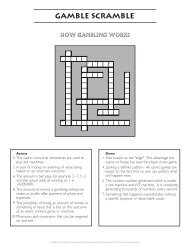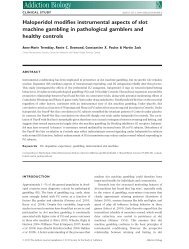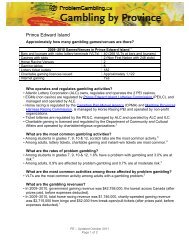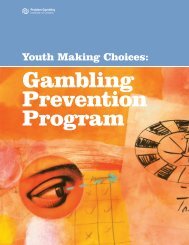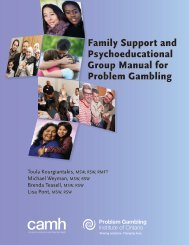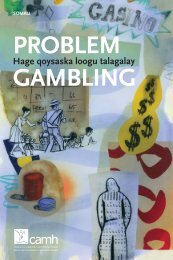Problem Gambling: A Guide for Helping Professionals
Problem Gambling: A Guide for Helping Professionals
Problem Gambling: A Guide for Helping Professionals
You also want an ePaper? Increase the reach of your titles
YUMPU automatically turns print PDFs into web optimized ePapers that Google loves.
Talking about <strong>Gambling</strong><br />
• complains of boredom or restlessness<br />
• seems depressed or suicidal.<br />
financial signs<br />
The client:<br />
• frequently borrows money or asks <strong>for</strong> salary advances<br />
• takes a second job without a change in finances<br />
• cashes in savings accounts, RRSPs or insurance plans<br />
• alternates between being broke and flashing money<br />
• family members complain that valuables and appliances are disappearing,<br />
or money is missing from a bank account or wallet.<br />
health signs<br />
The client complains of stress-related health problems, such as:<br />
• headaches<br />
• stomach and bowel problems<br />
• difficulty sleeping<br />
• overeating, or loss of appetite.<br />
Asking about <strong>Gambling</strong><br />
Establish a rapport that invites disclosure and motivates change.<br />
Shame, embarrassment or fear of disclosure may keep people who<br />
gamble from revealing the true nature of their problems. The challenge<br />
is to provide a safe and supportive environment that will facilitate disclosure<br />
in a manner that will allow you to address concerns and link<br />
people to appropriate help.<br />
It is rarely helpful to ask directly “Are you having a problem with<br />
gambling” Some clients may not have insight into how their problems<br />
are associated with gambling. For other clients, this blunt approach may<br />
lead to a defensive response and leave the client unwilling to explore<br />
the issue further.<br />
27





